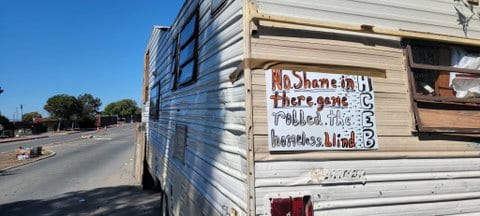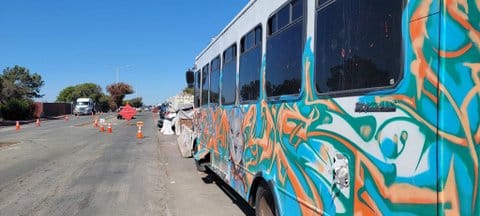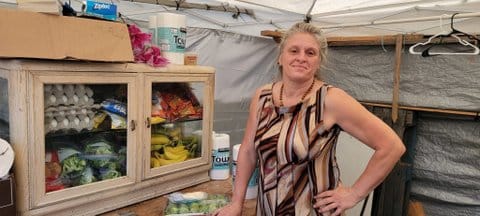
04 Oct Rydin Road RV Camp Cleared; Residents Say They Felt Forced to Leave Their Homes

Story and photos by Mitzi Pérez-Caro for Richmond Confidential
By Saturday, the last 28 people living in vehicles on Rydin Road were relocated by Richmond’s Public Works and Police departments.
Non-functioning vehicles and the remaining recreational vehicles were moved to Safe Organized Spaces, under Interstate 580. Residents are temporarily being housed in motels in the surrounding area including in Pinole, Pittsburg, and Brookside Shelter in Richmond. Former Rydin Road residents can work on their vehicles from 9 a.m. to 1 p.m. daily at SOS.
>>>Read: Q&A: ‘We Need to Now Build New Approaches to Homelessness’
“I have been informed by City staff that the last RV has left Rydin Road,” Mayor Tom Butt posted on Facebook on Saturday. “All previous campers have been relocated into suitable housing or shelters. Next is Hensley/Castro with some 100 campers. Good work, City staff! You did it!”
- Jessi Taran’s bus on Rydin Road.
Rain Citro resents being forced to leave Rydin Road after he and his partner were told by the city to leave the gun range on Goodrick Avenue and relocate to Rydin Road three years ago.
”It feels like it was a mistake; we were happy out there,” Citro said. “Due to circumstances beyond my control, medical reasons, we needed to get closer to civilization.”
James Foster said the same thing happened to him. And like Citro, he would have preferred to stay at Rydin.
“I was directed here by law enforcement. I was in a residential area. They suggested and recommended that I come to Rydin Road,” Foster said.
Many people who had been living on Rydin had already left by mid-September, after the city imposed a Sept. 30 deadline. At its Sept. 20 meeting, City Council pushed back that deadline to Oct. 21 for residents with extenuating circumstances.
Lina Velasco, director of community development, told the council that relocating Rydin residents is only a short term intervention. The city is in the process of drafting a strategic plan to address homelessness. The council is slated to adopt that plan by February.
Velasco said people have a few options: a shelter bed in Oakland’s Fremont Hotel, Glo independent living program or a shelter bed provided by the county upon request. The city also is open to work with other assistance programs.
Relocating to a shelter doesn’t suit Jessi Taran, who wants to keep living in her colorfully painted bus.
“I choose to live on my bus. I don’t want anyone to feel sorry for me. This is what I want to do. I don’t agree with our current economic paradigm, “ she said. “I don’t feel like it is a good deal for me to give up my life for an apartment. I’m disabled. To me, this is the best solution. I am being fiscally responsible living within my means. I shouldn’t be punished for that.”
- Jessi Taran with her kiosk out of which she distributed donated food, water and solar energy.
Taran is among those who created a sense of community at Rydin. She had a kiosk at the center of the encampment out of which she distributed donated food, water and solar energy.
According to the county’s point-in-time count this year, the people who live in RV encampments on Rydin Road and on Castro Street, which also will soon be cleared, are among 632 unhoused residents in Richmond. Rydin residents are getting some relocation money, with $50,000 being equally distributed among them.
Kathleen Sullivan, former director at Greater Richmond Interfaith Program and now a Homeless Task Force member with the city, suggested using the money to help Rydin residents get their vehicles repaired, licensed and insured. She said it would be beneficial for the city to partner with an auto repair business to make the vehicles movable.
>>>Read: Unhoused Narratives: Hoping for Better Days
Foster agreed that fixing his vehicle would be a better solution. He wants to know what the options are for people who do not want a shelter bed.
Taran said a tiny home community where residents gain training in a marketable skill would be a better solution.
“Instead of being homeless, they would be a skilled workforce. It would draw industry to the area. It would provide housing,” she said. “Once they get a job they could either choose to leave, or choose to give a third of their income to the housing community. It would pay for itself.”
This article was originally published Oct. 2, 2022, by Richmond Confidential. It has been reproduced with permission.








No Comments